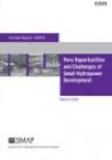Publications
The Peruvian power market was established in 1992, amid serious supply constraints and financially distressed power utilities. Since its inception, the market has been adapted by competitive market reforms and adaptations due to government-driven public policy objectives. This paper analyzes the experience of Peru with power markets, including market design, implementation, and outcomes. A cost-based power pool with locational marginal prices was established overnight, with bilateral contracts among market participants and regulated capacity payments. After an initial period of rapid investment, sluggish capacity additions and a prolonged drought in 2003-04 motivated the successful introduction of competitive supply auctions in 2006, to ensure that needed capacity additions were made to meet demand growth. Competitive auctions for renewable capacity have also been successful, attracting investment at falling prices.
However, the market has been adapted by the government, pushing technology-specific auctions to develop a balanced mix of gas and hydro power generation, with additional costs passed through to final customers. As a result, supply is less prone to hydrological conditions, but it is now subject to gas transport constraints; prices are depressed at US$9/megawatt hour; and the reserve margin increased to 81 percent in 2017. Overall, continuous adaptations to the Peruvian power market have delivered competitive outcomes, with concentration falling steadily and security of supply increasing over the past decade. However, the mixed approach of competitive forces and government-driven adaptations for public policy objectives calls into question the long-term efficiency of the market.
Power Markets | Evaluates developing country experiences with design and operation of wholesale power markets and identifies the necessary preconditions for markets to function. To learn more, download the literature review, and look out for forthcoming power market cases for Colombia, India, Peru, and Philippines.
Rudnick, Hugh; Velasquez, Constantin. 2019. Learning from Developing Country Power Market Experiences : The Case of Peru (English). Policy Research working paper; no. WPS 8772; Rethinking Power Sector Reform. Washington, D.C. : World Bank Group. http://documents.worldbank.org/curated/en/122241552317273992/Learning-from-Developing-Country-Power-Market-Experiences-The-Case-of-Peru

